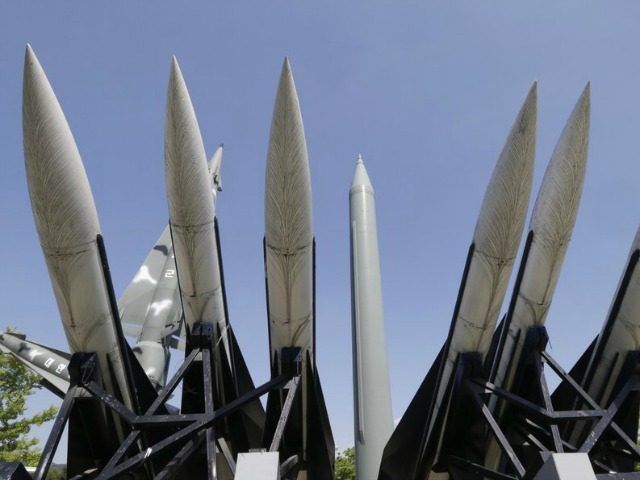The North Korean government conducted its fourth failed launch of a medium-range Musudan missile on Monday morning local time, a sign experts are interpreting as indicating increased desperation on the part of the Kim Jong-un regime in the midst of some of the sternest global sanctions in history.
Describing the failed launch as an “embarrassment,” Fox News notes that, far from achieving its estimated reach of more than 2,000 miles, the Musudan missile in question barely flew in the air before exploding into pieces. South Korean officials put the launch time at around 5 a.m. local time, and they suggest that more may be on the way to rapidly erase the memory of this latest failure, according to the Chinese state media outlet Xinhua.
The North Korean government did not warn the United Nations or neighboring countries that the launch was scheduled for Monday, as is customary in international law. Asian intelligence agents were notified of the possibility of such a launch, however. The Japanese military ordered naval destroyers and anti-ballistic missile Patriot batteries to be on alert for any missiles coming from North Korea’s direction on Sunday.
This is the fourth failed attempt to launch a Musudan missile on behalf of the communist autocracy. North Korea has launched three others this year – including a particularly embarrassing one on Kim Il-sung’s birthday – that have exploded mid-flight, and appears poised to schedule more, as the missile would greatly expand the nation’s ability to threaten its neighbors, including the United States. A successful Musudan missile launch can hit the American island of Guam.
The move comes at a time in which North Korea appeared to have shifted its strategy to seek more diplomacy with its neighbors. Foreign relations chief Ri Su-yong is currently on a three-day visit to China, where he is meeting high-level officials in the hopes of restoring the frayed ties between the two communist governments. According to Xinhua, Ri met with Song Tao, minister of the International Department of the Chinese Communist Party, and agreed to work for the “promotion of regional peace and stability” in Asia and “strengthen exchanges and cooperation between the two parties.”
“Both sides agreed that they highly value the China-DPRK traditional friendship, and that the exchanges and cooperation between the two parties should continue to be strengthened,” the outlet added.
North Korean media appear to be promoting the Pyongyang-Beijing alliance, as one of the top stories in state newspaper Rodong Sinmun involves Kim Jong-un attending a friendly basketball match between teams of both nations. The match was in Pyongyang, and the North Korean team won.
Kim has also attempted to improve ties between his country and South Korea and the United States. After months of North Korean propaganda threatening a preemptive nuclear strike on Washington or Seoul – a move that led a Russian diplomat to threaten that North Korea may get itself invaded – the North Korean government began to repeatedly demand South Korea enter diplomatic talks with its neighbor to the north. According to South Korean officials, who rejected the invitation, North Korean officials were seeking a “working-level meeting” to discuss reunification under Kim Jong-il.
North Korea also released a propaganda video featuring ethnic white Americans – the sons of a defector during the Korean War – urging Washington to come to the table with North Korea and end all its sanctions on the rogue state.

COMMENTS
Please let us know if you're having issues with commenting.